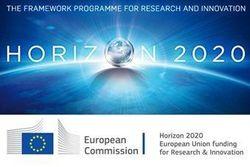
Researchers from LCSS (Lithuania Centre for Social Sciences) Institute of Economics and Rural Development evaluate the achievements of one of the 20 European Multi-Actor Platforms for Inclusive Rural Policy
The activities of the European Union's research and innovation program HORIZON 2020 project "SHERPA - Sustainable Hub to Engage into Rural Policies with Actors" are already counting the results of the first project implementation cycle.
In the first phase of the project, over 20 consortium partners from all over Europe laid the foundations and successfully launched the project activities: prepared 20 Dynamic Action Plans, established 20 Multi-Actor Platforms (MAPs) for inclusive rural policy, and run the first project implementation cycle, aiming to provide reflection and insights on a long-term vision for European rural development until 2040 in seven thematic areas:
- Demographic shift: depopulation, aging
- Climate change and environmental services
- Shift in production and diversification of the rural economy
- Infrastructure and basic services
- The rise of digitalisation and smart ruralities
- Inequalities and well-being in rural areas
- Land-use competition
During the first phase of the project, researchers from the LCSS Institute of Economics and Rural Development developed a Dynamic Action Plan for Lithuania and established one of the 20 MAPs for inclusive rural policy titled “Circular Bio-economy - Lithuania” (CBioLit), uniting science, society, and political stakeholders.
15 Lithuanian experts, proportionally representing the interests of science, society and politics, discussed and shared their insights in the Lithuanian MAP throughout the first cycle of the SHERPA project. By discussing the featured characteristics of Lithuanian rural development, the most relevant development directions for the future of the region were singled out. Summarized reflections and insights had been placed in the Lithuanian Position Paper on Long Term Rural Vision 2040 and presented for discussion and approval at the Lithuanian MAP Consensus Meeting on October 28, 2020. After reaching consensus, the Lithuanian Position Paper was then transmitted to the project leaders, who prepared a joint SHERPA Position Paper from all partner regions.
During the first virtual annual SHERPA conference, which was held on November 30-December 1, 2020, all European MAPs presented summarized results of discussions on regional rural visions to the representatives of the European Commission. A draft SHERPA position paper was also presented for discussion at the conference. After received summarizing reflections, the final SHERPA position paper on a long-term vision for European rural areas was prepared in February 2021, completing the first cycle of the SHERPA project. This reflectively created document has been submitted to the European Commission and is being used in the European Parliament's deliberations on a long-term vision for European rural development.
In February 2021, after the completion of the first cycle of the SHERPA project, the achievements of the Lithuanian MAP were assessed by interviewing the experts who participated in its activities. The summarized results of the expert survey show that the Lithuanian position paper prepared during the first MAP cycle identifies the most relevant long-term perspectives of Lithuanian rural development, which are also reflected in the generalized SHERPA position paper document. The experts were happy to have the opportunity to participate in live and virtual discussions at the round table despite the restrictions of a pandemic situation and thus contribute to the creation of a reflective long-term European rural vision by representing Lithuania's current issues in the respective field. The SHERPA policy-making process, based on the Delfi methodology, left a positive impression on Lithuanian experts due to its versatility, reflectivity, and inclusiveness in the participation of consensus-based bottom-up policymaking.
In the second cycle of the SHERPA project, the topical issues of the future of European rural areas in the regional MAPs will be discussed more purposefully and in-depth by selecting specific areas of regional relevance according to the long-term European rural vision directions, identified during the first project cycle.
SHERPA project comprehensively addresses the full scope of the H2020 Coordination and Support Action for the topic “RUR-01-2018-2019 - D Rural society-science-policy hub”, agreement no. 862448.
Total project budget is 5 mln. Eur. Project duration: 4 years.
More detailed information is available online: https://rural-interfaces.eu/
Link to the SHERPA Pozition paper: https://rural-interfaces.eu/resources-and-tools/rural-policy-papers/
Project coordinator in Lithuania dr. Živilė Gedminaitė-Raudonė
tel. (8 5) 261 7071, el.p.zivile.gedminaite@ekvi.lt;
tel. (8672) 00413, el.p. rita.vilke@ekvi.lt
© Reference is obligatory.
